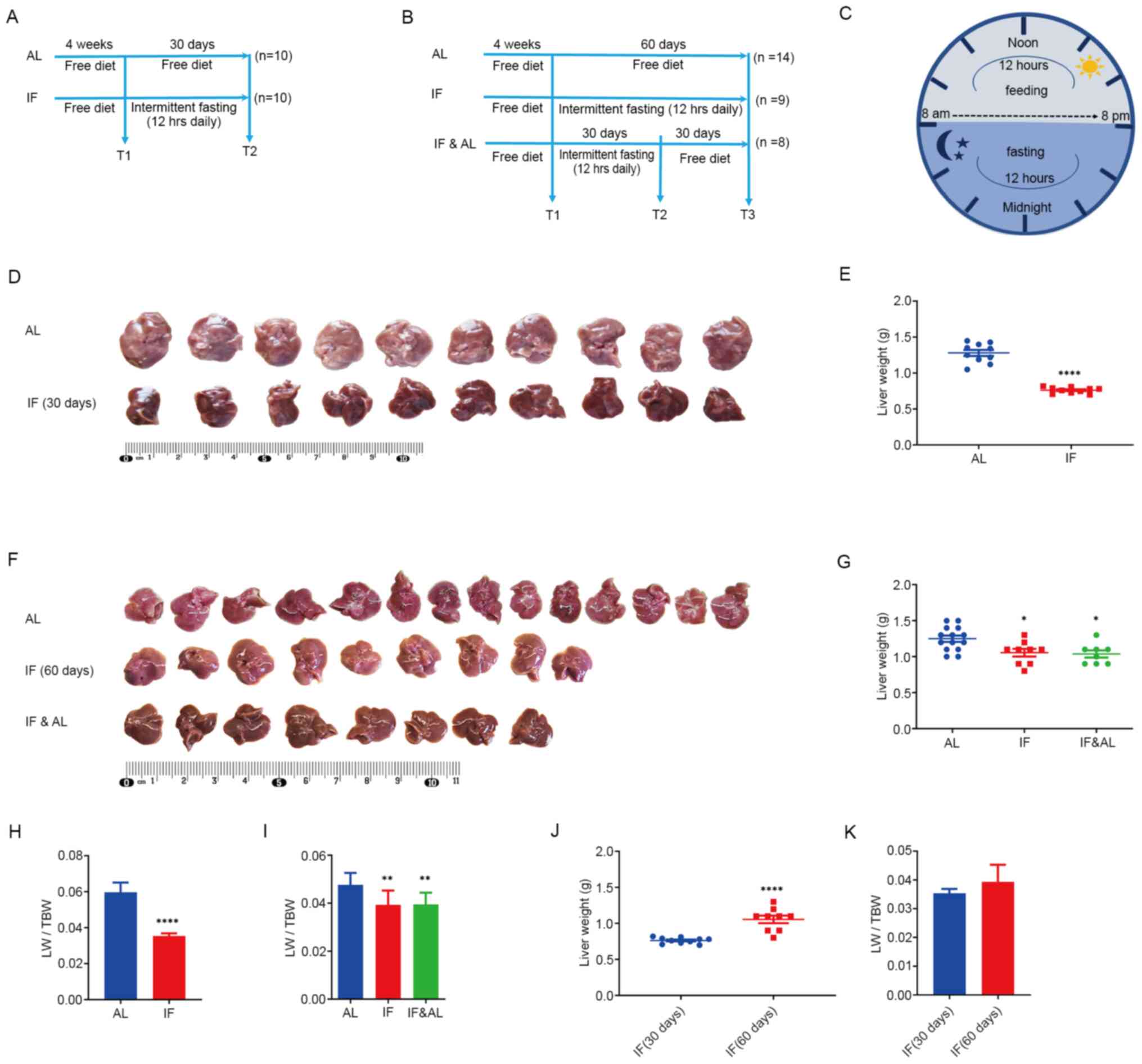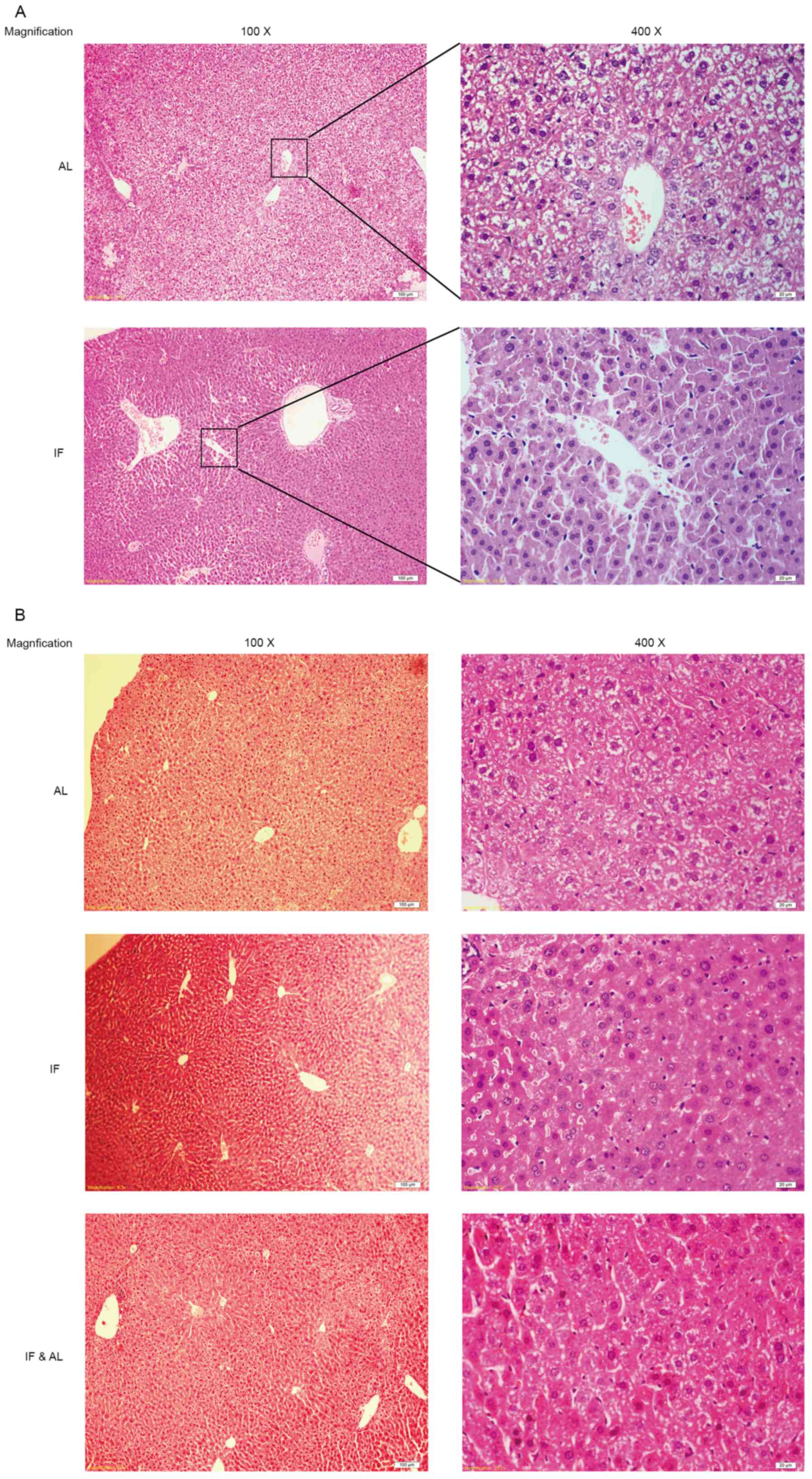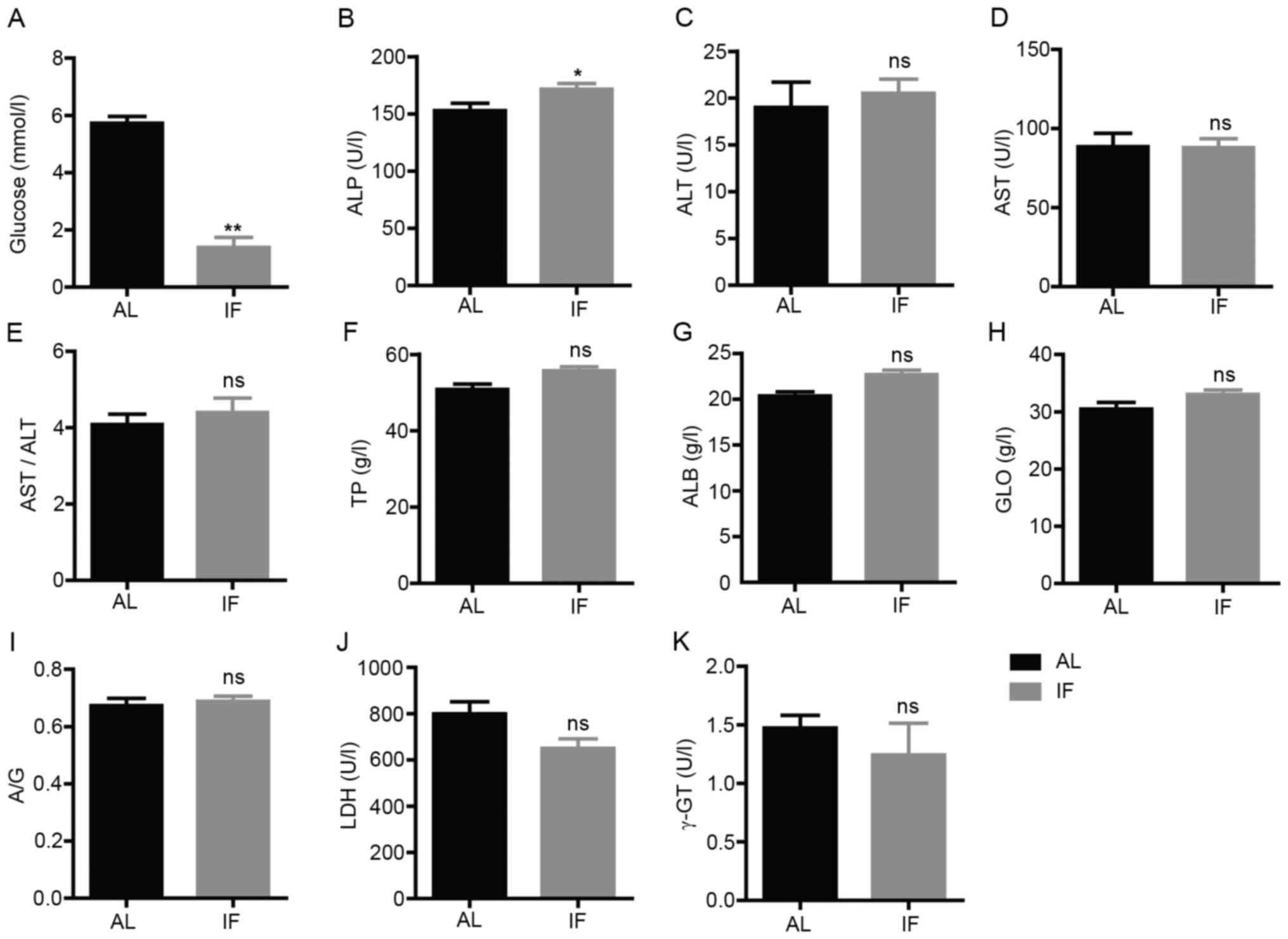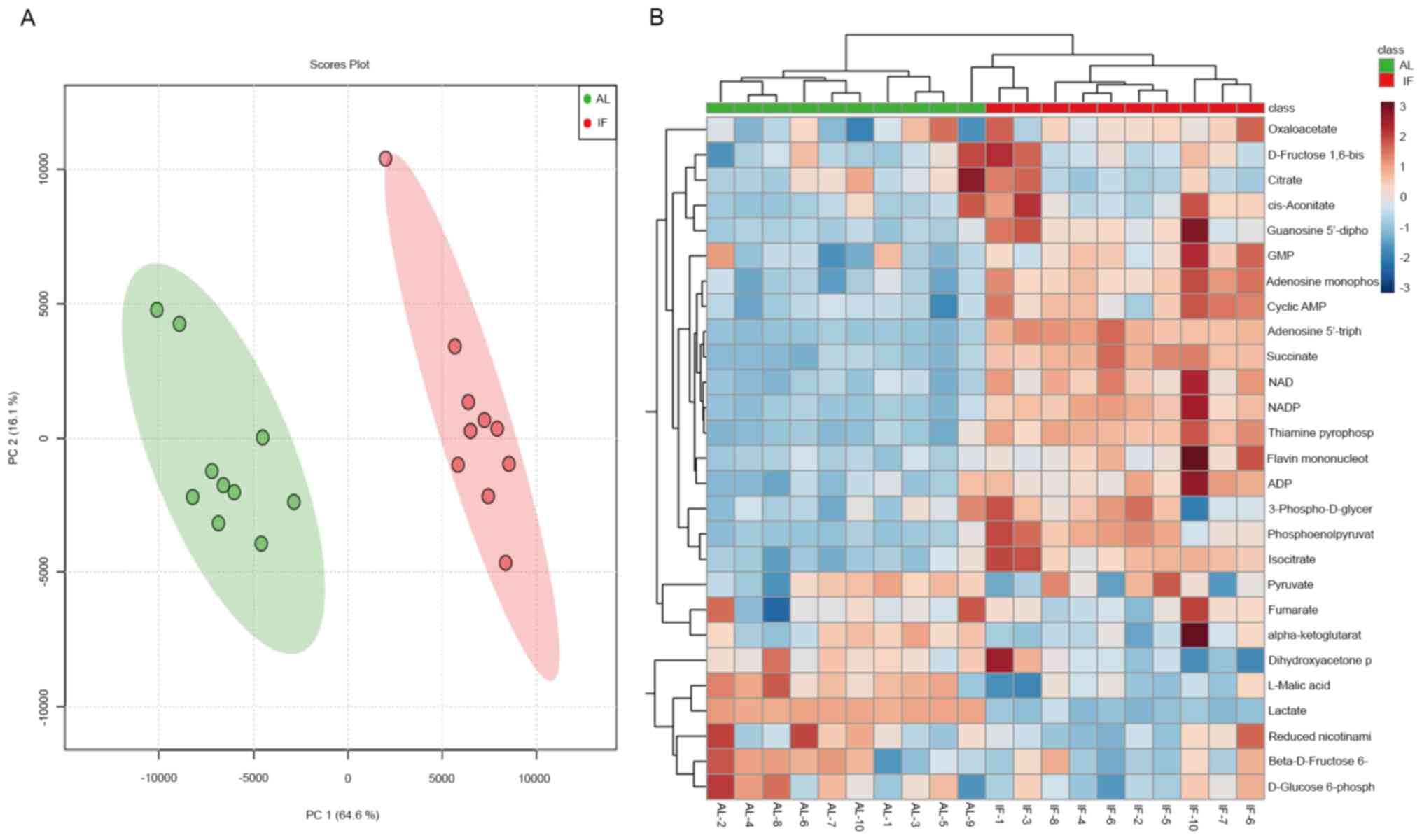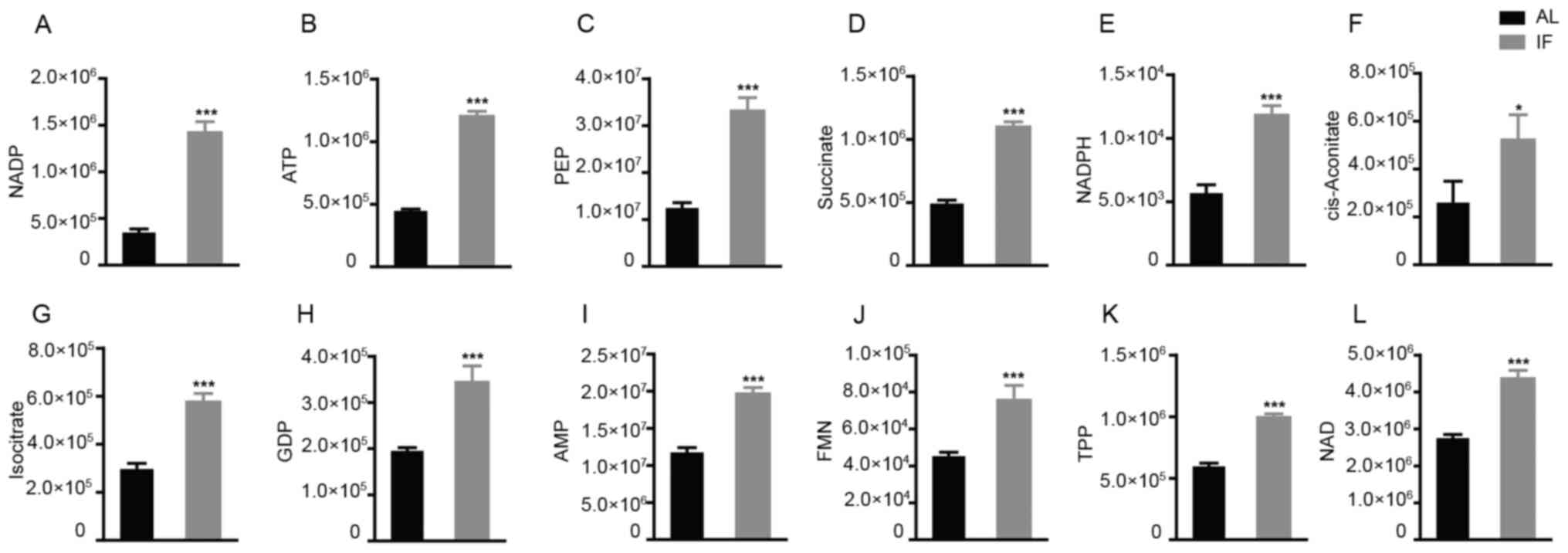|
1
|
de Cabo R, Carmona-Gutierrez D, Bernier M,
Hall MN and Madeo F: The search for antiaging interventions: From
elixirs to fasting regimens. Cell. 157:1515–1526. 2014.PubMed/NCBI View Article : Google Scholar
|
|
2
|
Longo VD and Panda S: Fasting, circadian
rhythms, and time-restricted feeding in healthy lifespan. Cell
Metab. 23:1048–1059. 2016.PubMed/NCBI View Article : Google Scholar
|
|
3
|
Mitchell SJ, Bernier M, Mattison JA, Aon
MA, Kaiser TA, Anson RM, Ikeno Y, Anderson RM, Ingram DK and de
Cabo R: Daily fasting improves health and survival in male mice
independent of diet composition and calories. Cell Metab.
29:221–228.e3. 2019.PubMed/NCBI View Article : Google Scholar
|
|
4
|
Lessan N and Ali T: Energy metabolism and
intermittent fasting: The Ramadan perspective. Nutrients.
11(1192)2019.PubMed/NCBI View Article : Google Scholar
|
|
5
|
Patterson RE, Laughlin GA, LaCroix AZ,
Hartman SJ, Natarajan L, Senger CM, Martínez ME, Villaseñor A,
Sears DD, Marinac CR and Gallo LC: Intermittent fasting and human
metabolic health. J Acad Nutr Diet. 115:1203–1212. 2015.PubMed/NCBI View Article : Google Scholar
|
|
6
|
Harney DJ, Hutchison AT, Hatchwell L,
Humphrey SJ, James DE, Hocking S, Heilbronn LK and Larance M:
Proteomic analysis of human plasma during intermittent fasting. J
Proteome Res. 18:2228–2240. 2019.PubMed/NCBI View Article : Google Scholar
|
|
7
|
Patterson RE and Sears DD: Metabolic
effects of intermittent fasting. Annu Rev Nutr. 37:371–393.
2017.PubMed/NCBI View Article : Google Scholar
|
|
8
|
Ahmad S and Chowdhury TA: Fasting during
Ramadan in people with chronic kidney disease: A review of the
literature. Ther Adv Endocrinol Metab.
10(2042018819889019)2019.PubMed/NCBI View Article : Google Scholar
|
|
9
|
Weindruch R and Sohal RS: Seminars in
medicine of the Beth Israel deaconess medical center. Caloric
intake and aging. N Engl J Med. 337:986–994. 1997.PubMed/NCBI View Article : Google Scholar
|
|
10
|
Baumeier C, Kaiser D, Heeren J, Scheja L,
John C, Weise C, Eravci M, Lagerpusch M, Schulze G, Joost HG, et
al: Caloric restriction and intermittent fasting alter hepatic
lipid droplet proteome and diacylglycerol species and prevent
diabetes in NZO mice. Biochim Biophys Acta. 1851:566–576.
2015.PubMed/NCBI View Article : Google Scholar
|
|
11
|
Belkacemi L, Selselet-Attou G, Bulur N,
Louchami K, Sener A and Malaisse WJ: Intermittent fasting
modulation of the diabetic syndrome in sand rats. III. Post-mortem
investigations. Int J Mol Med. 27:95–102. 2011.PubMed/NCBI View Article : Google Scholar
|
|
12
|
Horne BD, Muhlestein JB and Anderson JL:
Health effects of intermittent fasting: Hormesis or harm? A
systematic review. Am J Clin Nutr. 102:464–470. 2015.PubMed/NCBI View Article : Google Scholar
|
|
13
|
Jane L, Atkinson G, Jaime V, Hamilton S,
Waller G and Harrison S: Intermittent fasting interventions for the
treatment of overweight and obesity in adults aged 18 years and
over: A systematic review protocol. JBI Database System Rev
Implement Rep. 13:60–68. 2015.PubMed/NCBI View Article : Google Scholar
|
|
14
|
Nair KS, Woolf PD, Welle SL and Matthews
DE: Leucine, glucose, and energy metabolism after 3 days of fasting
in healthy human subjects. Am J Clin Nutr. 46:557–562.
1987.PubMed/NCBI View Article : Google Scholar
|
|
15
|
Müller MJ, Enderle J, Pourhassan M, Braun
W, Eggeling B, Lagerpusch M, Glüer CC, Kehayias JJ, Kiosz D and
Bosy-Westphal A: Metabolic adaptation to caloric restriction and
subsequent refeeding: The minnesota starvation experiment
revisited. Am J Clin Nutr. 102:807–819. 2015.PubMed/NCBI View Article : Google Scholar
|
|
16
|
Mansell PI and Macdonald IA: The effect of
starvation on insulin-induced glucose disposal and thermogenesis in
humans. Metabolism. 39:502–510. 1990.PubMed/NCBI View Article : Google Scholar
|
|
17
|
Webber J and Macdonald IA: The
cardiovascular, metabolic and hormonal changes accompanying acute
starvation in men and women. Br J Nutr. 71:437–447. 1994.PubMed/NCBI View Article : Google Scholar
|
|
18
|
Haouari M, Haouari-Oukerro F, Sfaxi A, Ben
Rayana MC, Kâabachi N and Mbazâa A: How Ramadan fasting affects
caloric consumption, body weight, and circadian evolution of
cortisol serum levels in young, healthy male volunteers. Horm Metab
Res. 40:575–577. 2008.PubMed/NCBI View Article : Google Scholar
|
|
19
|
Kul S, Savaş E, Öztürk ZA and Karadağ G:
Does Ramadan fasting alter body weight and blood lipids and fasting
blood glucose in a healthy population? A meta-analysis. J Relig
Health. 53:929–942. 2014.PubMed/NCBI View Article : Google Scholar
|
|
20
|
Sadeghirad B, Motaghipisheh S, Kolahdooz
F, Zahedi MJ and Haghdoost AA: Islamic fasting and weight loss: A
systematic review and meta-analysis. Public Health Nutr.
17:396–406. 2014.PubMed/NCBI View Article : Google Scholar
|
|
21
|
Charlton MR: Protein metabolism and liver
disease. Baillieres Clin Endocrinol Metab. 10:617–635.
1996.PubMed/NCBI View Article : Google Scholar
|
|
22
|
Lawrence YA, Guard BC, Steiner JM,
Suchodolski JS and Lidbury JA: Untargeted metabolomic profiling of
urine from healthy dogs and dogs with chronic hepatic disease. PLoS
One. 14(e0217797)2019.PubMed/NCBI View Article : Google Scholar
|
|
23
|
Besse-Patin A, Jeromson S,
Levesque-Damphousse P, Secco B, Laplante M and Estall JL: PGC1A
regulates the IRS1:IRS2 ratio during fasting to influence hepatic
metabolism downstream of insulin. Proc Natl Acad Sci USA.
116:4285–4290. 2019.PubMed/NCBI View Article : Google Scholar
|
|
24
|
Moore MC, Coate KC, Winnick JJ, An Z and
Cherrington AD: Regulation of hepatic glucose uptake and storage in
vivo. Adv Nutr. 3:286–294. 2012.PubMed/NCBI View Article : Google Scholar
|
|
25
|
Ramnanan CJ, Edgerton DS, Kraft G and
Cherrington AD: Physiologic action of glucagon on liver glucose
metabolism. Diabetes Obes Metab. 13 (Suppl 1):S118–S125.
2011.PubMed/NCBI View Article : Google Scholar
|
|
26
|
Gibney MJ, Walsh M, Brennan L, Roche HM,
German B and van Ommen B: Metabolomics in human nutrition:
Opportunities and challenges. Am J Clin Nutr. 82:497–503.
2005.PubMed/NCBI View Article : Google Scholar
|
|
27
|
Hollywood K, Brison DR and Goodacre R:
Metabolomics: Current technologies and future trends. Proteomics.
6:4716–4723. 2006.PubMed/NCBI View Article : Google Scholar
|
|
28
|
de Cabo R and Mattson MP: Effects of
intermittent fasting on health, aging, and disease. N Engl J Med.
381:2541–2551. 2019.PubMed/NCBI View Article : Google Scholar
|
|
29
|
Golbidi S, Daiber A, Korac B, Li H, Essop
MF and Laher I: Health benefits of fasting and caloric restriction.
Curr Diab Rep. 17(123)2017.PubMed/NCBI View Article : Google Scholar
|
|
30
|
Johnson EL: Seizures and epilepsy. Med
Clin North Am. 103:309–324. 2019.PubMed/NCBI View Article : Google Scholar
|
|
31
|
Guo ZV, Hires SA, Li N, O'Connor DH,
Komiyama T, Ophir E, Huber D, Bonardi C, Morandell K, Gutnisky D,
et al: Procedures for behavioral experiments in head-fixed mice.
PLoS One. 9(e88678)2014.PubMed/NCBI View Article : Google Scholar
|
|
32
|
Tucci V, Hardy A and Nolan PM: A
comparison of physiological and behavioural parameters in C57BL/6J
mice undergoing food or water restriction regimes. Behav Brain Res.
173:22–29. 2006.PubMed/NCBI View Article : Google Scholar
|
|
33
|
Longo VD and Mattson MP: Fasting:
Molecular mechanisms and clinical applications. Cell Metab.
19:181–192. 2014.PubMed/NCBI View Article : Google Scholar
|
|
34
|
Wegman MP, Guo MH, Bennion DM, Shankar MN,
Chrzanowski SM, Goldberg LA, Xu J, Williams TA, Lu X, Hsu SI, et
al: Practicality of intermittent fasting in humans and its effect
on oxidative stress and genes related to aging and metabolism.
Rejuvenation Res. 18:162–172. 2015.PubMed/NCBI View Article : Google Scholar
|
|
35
|
Manzanero S, Erion JR, Santro T, Steyn FJ,
Chen C, Arumugam TV and Stranahan AM: Intermittent fasting
attenuates increases in neurogenesis after ischemia and reperfusion
and improves recovery. J Cereb Blood Flow Metab. 34:897–905.
2014.PubMed/NCBI View Article : Google Scholar
|
|
36
|
Farooq N, Priyamvada S, Arivarasu NA,
Salim S, Khan F and Yusufi AN: Influence of Ramadan-type fasting on
enzymes of carbohydrate metabolism and brush border membrane in
small intestine and liver of rat used as a model. Br J Nutr.
96:1087–1094. 2006.PubMed/NCBI View Article : Google Scholar
|
|
37
|
Mohany M, Ashton N, Harrath AH, Nyengaard
JR, Alomar SY and Alwasel S: A new model for fetal programming:
Maternal Ramadan-type fasting programs nephrogenesis. J Dev Orig
Health Dis. 9:287–298. 2018.PubMed/NCBI View Article : Google Scholar
|
|
38
|
Salim S, Farooq N, Priyamvada S, Asghar M,
Khundmiri SJ, Khan S, Khan F and Yusufi AN: Influence of
Ramadan-type fasting on carbohydrate metabolism, brush border
membrane enzymes and phosphate transport in rat kidney used as a
model. Br J Nutr. 98:984–990. 2007.PubMed/NCBI View Article : Google Scholar
|
|
39
|
Fernando HA, Zibellini J, Harris RA,
Seimon RV and Sainsbury A: Effect of Ramadan fasting on weight and
body composition in healthy non-athlete adults: A systematic review
and meta-analysis. Nutrients. 11(478)2019.PubMed/NCBI View Article : Google Scholar
|
|
40
|
Sethi BK and Nagesh VS: Weight management
in Ramadan. J Pak Med Assoc. 65 (5 Suppl 1):S54–S56.
2015.PubMed/NCBI
|
|
41
|
Hutchison AT and Heilbronn LK: Metabolic
impacts of altering meal frequency and timing-does when we eat
matter? Biochimie. 124:187–197. 2016.PubMed/NCBI View Article : Google Scholar
|
|
42
|
Mattson MP, Allison DB, Fontana L, Harvie
M, Longo VD, Malaisse WJ, Mosley M, Notterpek L, Ravussin E, Scheer
FA, et al: Meal frequency and timing in health and disease. Proc
Natl Acad Sci USA. 111:16647–16653. 2014.PubMed/NCBI View Article : Google Scholar
|
|
43
|
Marinac CR, Natarajan L, Sears DD, Gallo
LC, Hartman SJ, Arredondo E and Patterson RE: Prolonged nightly
fasting and breast cancer risk: Findings from NHANES (2009-2010).
Cancer Epidemiol Biomarkers Prev. 24:783–789. 2015.PubMed/NCBI View Article : Google Scholar
|
|
44
|
Marinac CR, Nelson SH, Breen CI, Hartman
SJ, Natarajan L, Pierce JP, Flatt SW, Sears DD and Patterson RE:
Prolonged nightly fasting and breast cancer prognosis. JAMA Oncol.
2:1049–1055. 2016.PubMed/NCBI View Article : Google Scholar
|
|
45
|
Gill S and Panda S: A smartphone App
reveals erratic diurnal eating patterns in humans that can be
modulated for health benefits. Cell Metab. 22:789–798.
2015.PubMed/NCBI View Article : Google Scholar
|
|
46
|
Manoogian ENC and Panda S: Circadian
rhythms, time-restricted feeding, and healthy aging. Ageing Res
Rev. 39:59–67. 2017.PubMed/NCBI View Article : Google Scholar
|
|
47
|
Jain Gupta N and Khare A: Disruption in
daily eating-fasting and activity-rest cycles in Indian adolescents
attending school. PLoS One. 15(e0227002)2020.PubMed/NCBI View Article : Google Scholar
|
|
48
|
Chen K, Ma J, Jia X, Ai W, Ma Z and Pan Q:
Advancing the understanding of NAFLD to hepatocellular carcinoma
development: From experimental models to humans. Biochim Biophys
Acta Rev Cancer. 1871:117–125. 2019.PubMed/NCBI View Article : Google Scholar
|
|
49
|
Fu L and Kettner NM: The circadian clock
in cancer development and therapy. Prog Mol Biol Transl Sci.
119:221–282. 2013.PubMed/NCBI View Article : Google Scholar
|
|
50
|
Kim CW, Yun KE, Jung HS, Chang Y, Choi ES,
Kwon MJ, Lee EH, Woo EJ, Kim NH, Shin H and Ryu S: Sleep duration
and quality in relation to non-alcoholic fatty liver disease in
middle-aged workers and their spouses. J Hepatol. 59:351–357.
2013.PubMed/NCBI View Article : Google Scholar
|
|
51
|
Maury E: Off the clock: From circadian
disruption to metabolic disease. Int J Mol Sci.
20(1597)2019.PubMed/NCBI View Article : Google Scholar
|
|
52
|
Hunter AL and Ray DW: Circadian clock
regulation of hepatic energy metabolism regulatory circuits.
Biology (Basel). 8(79)2019.PubMed/NCBI View Article : Google Scholar
|
|
53
|
Christie S, Vincent AD, Li H, Frisby CL,
Kentish SJ, O'Rielly R, Wittert GA and Page AJ: A rotating light
cycle promotes weight gain and hepatic lipid storage in mice. Am J
Physiol Gastrointest Liver Physiol. 315:G932–G942. 2018.PubMed/NCBI View Article : Google Scholar
|
|
54
|
Fleet T, Stashi E, Zhu B, Rajapakshe K,
Marcelo KL, Kettner NM, Gorman BK, Coarfa C, Fu L, O'Malley BW and
York B: Genetic and environmental models of circadian disruption
link SRC-2 function to hepatic pathology. J Biol Rhythms.
31:443–460. 2016.PubMed/NCBI View Article : Google Scholar
|
|
55
|
Bertholdt L, Gudiksen A, Jessen H and
Pilegaard H: Impact of skeletal muscle IL-6 on regulation of liver
and adipose tissue metabolism during fasting. Pflugers Arch.
470:1597–1613. 2018.PubMed/NCBI View Article : Google Scholar
|
|
56
|
Marinho TS, Ornellas F, Barbosa-da-Silva
S, Mandarim-de-Lacerda CA and Aguila MB: Beneficial effects of
intermittent fasting on steatosis and inflammation of the liver in
mice fed a high-fat or a high-fructose diet. Nutrition. 65:103–112.
2019.PubMed/NCBI View Article : Google Scholar
|
|
57
|
Johnstone A: Fasting for weight loss: An
effective strategy or latest dieting trend? Int J Obes (Lond).
39:727–733. 2015.PubMed/NCBI View Article : Google Scholar
|
|
58
|
Barnosky AR, Hoddy KK, Unterman TG and
Varady KA: Intermittent fasting vs daily calorie restriction for
type 2 diabetes prevention: A review of human findings. Transl Res.
164:302–311. 2014.PubMed/NCBI View Article : Google Scholar
|
|
59
|
Carter S, Clifton PM and Keogh JB: The
effects of intermittent compared to continuous energy restriction
on glycaemic control in type 2 diabetes; a pragmatic pilot trial.
Diabetes Res Clin Pract. 122:106–112. 2016.PubMed/NCBI View Article : Google Scholar
|















